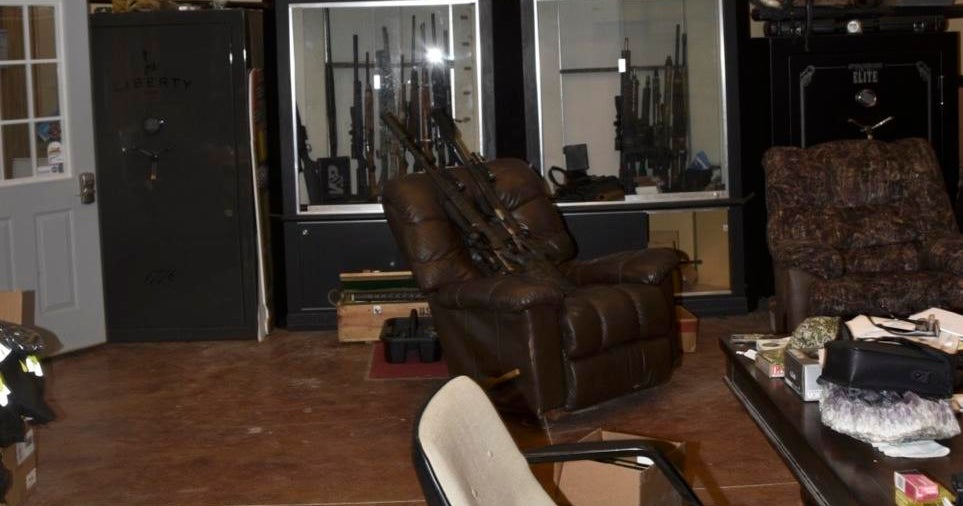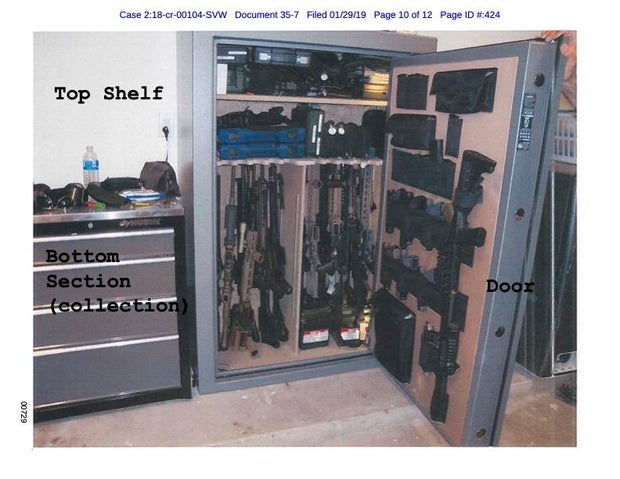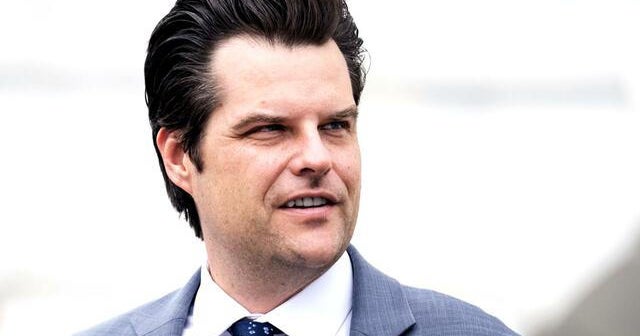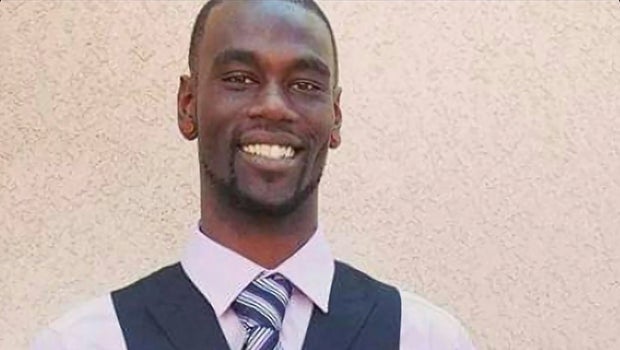CBS News
Police illegally sell restricted weapons supplying crime

Adair, Iowa, had a population of 794. So, it seemed suspicious when its three-person police department asked regulators to buy 90 machine guns, including an M134 Gatling-style minigun capable of shooting up to 6,000 rounds of ammunition every minute.
Federal agents later discovered Adair’s police chief, Bradley Wendt, was using his position to acquire weapons and sell them for personal profit. A jury convicted Wendt earlier this year of conspiracy to defraud the United States, lying to federal law enforcement and illegal possession of a machine gun. Wendt is unapologetic and has appealed his conviction.
“If I’m guilty of this, every cop in the nation’s going to jail,” Wendt told CBS News just days before a federal judge sentenced him to a 5-year prison term. Wendt’s crimes appear to be part of a nationwide pattern.
U.S. District Court, Southern District of Iowa
A CBS News investigation found dozens of law enforcement leaders — sheriffs, captains, lieutenants, chiefs of police — buying and illegally selling firearms, even weapons of war, across 23 U.S. states, Puerto Rico and Washington, D.C., from the Deep South to the Midwest, Northeast and California coast.
A nationwide review of government audits and court records over the last 20 years uncovered at least 50 cases of police illegally selling their weapons online, through dealers, out of their homes or the back of their cars. In many cases, the weapons were sold to gun enthusiasts, often at steep markups as high as 10 times what they were bought for.
In several cases, the guns wound up in the hands of violent felons and were used to commit crimes including drug trafficking, international arms dealing and, in one case, the fatal shooting of a 14-year-old boy attending a high school football game.
In 2011, federal agents busted a smuggling ring out of New Mexico involving a police chief, mayor and village trustee who delivered automatic firepower and tactical gear to a Mexican cartel.
A decade later, prosecutors uncovered a multistate conspiracy linking a sanctioned Russian arms dealer with three police chiefs, one sheriff and a Delta Force veteran who sold machine guns directly to a criminal trafficker. All of them pleaded guilty. An additional alleged co-conspirator, who worked as an intelligence analyst for the U.S. Department of Homeland Security, denied wrongdoing and his case is proceeding to trial.
Nearly 26,000 guns were traced from American crime scenes back to a government agency, law enforcement or the military between 2017 and 2021, the most recently available data, according to a report by the Bureau of Alcohol, Tobacco, Firearms and Explosives. It isn’t known how many of those were lost, stolen or sold. However, when government auditors investigated firearms that law enforcement agencies reported missing over a 15-year period, the General Services Administration Inspector General found that more than two-thirds had not gone missing at all but, rather, were inappropriately sold or traded —including Uzis and grenade launchers that were never recovered.
Meanwhile, a separate Government Accountability Office audit in 2018 found $100 million worth of guns and ammunition bought by U.S. Immigration and Customs Enforcement was unaccounted for. In response, ICE said that it improved how it would keep track of its inventory going forward; there was no follow-up about the weapons that were already missing. ICE did not respond to CBS News’ request for comment.
Of the 58 cases CBS News identified where law enforcement officers were criminally charged with illegally selling their weapons, 56 of them either admitted guilt or were convicted; two have denied wrongdoing in ongoing cases.
Those cases are just the tip of the iceberg, according to interviews with half a dozen former Bureau of Alcohol, Tobacco and Firearms agents who worked directly on these investigations. Several career agents shared anecdotes about letting police departments off with warnings after repeatedly finding their service weapons in the hands of private citizens. The agents explained that prosecutors have been generally reluctant to charge these cases, and the bureau stated that “it is our goal to educate, not investigate,” according to a 2017 law enforcement memo obtained by CBS News.
“We’re not looking to prosecute fellow law enforcement officers,” said Eric Harden, former special agent in charge of the ATF’s Los Angeles field division.
Harden authored the 2017 memo, which flagged a “growing trend” of “officers purchasing and then selling [restricted] firearms…for profit.” The memo warned that anyone doing this was functionally acting as a straw purchaser in violation of at least two federal laws.
Harden told CBS News that if officers persisted after being warned, or if their weapons were traced to a crime, they should be held accountable. “If we don’t do this, then it’ll be turning a blind eye and saying officers are above the law.”
Harden wrote the memo after his intelligence unit traced an outlawed pistol seized in a narcotics bust to a recent purchase by a beat cop in Pasadena, California. Now retired, Harden still remembers that officer crying on his shoulder when federal agents showed up to arrest him for illegally selling more than 100 weapons out of his home. The officer argued at the time that he didn’t know he was breaking the law, but he later pleaded guilty. He served less than a year in federal prison and paid a $10,000 fine but was allowed to keep his Porsche and Alfa Romeo.
U.S. District Court, Central District of California
On the other side of LA County, a U.S. Customs and Border Protection officer, with secret-level security clearance, was operating an even more egregious gun-running scheme that went on for 20 years. He too eventually pleaded guilty, in 2019, after an undercover agent busted him selling weapons out of the trunk of his car. His stockpile at the time totaled more than 250 firearms, including 41 machine guns and two short-barreled rifles.
The officer “betrayed his oath to uphold the laws of the United States solely to put more money in his pocket,” the U.S. Attorney said in announcing the news of the officer’s prison sentence.
Several cases involved sheriffs and police leadership who used their positions in law enforcement to gain access to military-grade machine guns, short-barreled rifles and explosive devices like grenades, and then sold them in violation of federal law.
Although the Second Amendment guarantees the right to bear arms, there are limits to the kinds of weapons people are allowed to possess. Post-1986, these weapons — known to the ATF as Class 3/Title II and to the gun industry as “posties”— have been restricted for official government use because of their deadly firepower. Many of them are battlefield weapons used by U.S. and NATO forces in conflict zones. Some ammunition can take out a helicopter or blow straight through an armored tank followed by a concrete building, out the other side, then explode, hitting targets 18 football fields away. These guns can spew hundreds of rounds each minute, faster than the speed of sound.
“Congress knew almost 100 years ago, in the days of Al Capone, that fully automatic weapons were unusually dangerous,” ATF Director Steven Dettelbach said a public address on Feb. 28, 2023. “They have no place in our communities.”
The government loophole, however, has been exploited by opportunists who recruit law enforcement conspirators to help them bypass the American machine gun prohibition, according to law enforcement records and court filings obtained by CBS News that include text messages, videos and wiretapped audio conversations between people who were either convicted of or admitted participation in these schemes.
CBS News found a trail of activity in social media videos and online web forums frequented by firearm aficionados discussing how to entice law enforcement allies into this illicit trade, which can be highly lucrative. Amid a series of online conversations reviewed by CBS News, one poster suggested that after law enforcement acquired a $10,000 machine gun through the federal approval process, it could be worth $75,000 because it would be free of red tape. Wendt, the Iowa police chief, for example, at times earned more than a 90% profit margin, according to court records.
“Here is a breakdown of who signs for me,” advised another online user, identifying one police chief, one sheriff, one SWAT officer and one deputy sheriff with whom he said he attended high school.
For police departments to get ahold of such high-powered weaponry, each one needs permission from the ATF. Even though it has been the law for more than three decades, the ATF only started vetting every machine gun application for the first time in January 2023 to confirm that a legitimate government agency was making the request.
According to interviews with half a dozen longtime ATF officials who worked directly on these cases, the bureau typically does not assess the appropriateness of the weapons for a department or track where they end up.
“There’s no audits,” said former Supervisory Special Agent Tim Graden, who worked at the ATF for more than two decades before retiring in 2022. “There was no second-guessing whatsoever. They weren’t really — I don’t want to use the word concerned, but I can’t think of a better one.”
The Bureau of Alcohol, Tobacco, Firearms and Explosives declined requests to comment.
It’s unclear how pervasive this is nationwide, but in Iowa alone over the past five years, the ATF did not deny a single law enforcement request for machine guns “based on suitability (or lack thereof),” according to court filings. By 2023, there were more than 1,200 machine guns registered to law enforcement across the state.
To find out how that compares to other places, CBS News filed a series of Freedom of Information Act requests with the ATF for details about the high-powered arsenal it’s granted to public law enforcement over the past decade. However, the bureau denied those requests, stating that it considers that private tax information exempt from public disclosure. Last week, CBS News filed a lawsuit for the information.
The proliferation of this high-powered weaponry is likely to become increasingly more relevant when President-elect Donald Trump takes office. During his first administration, Trump revoked an Obama-era executive order restricting the transfer of military equipment from the Defense Department to law enforcement nationwide. The Trump transition team did not respond to a request for comment.
contributed to this report.
CBS News
12/4: The Daily Report – CBS News

Watch CBS News
Be the first to know
Get browser notifications for breaking news, live events, and exclusive reporting.
CBS News
2 students wounded in shooting at Northern California school

Watch CBS News
Be the first to know
Get browser notifications for breaking news, live events, and exclusive reporting.
CBS News
Memphis police discriminate against Black people and use excessive force, Justice Department report finds

The Memphis Police Department uses excessive force and discriminates against Black people, according to the findings of a U.S. Department of Justice investigation launched after the beating death of Tyre Nichols after a traffic stop in 2023.
A report released Wednesday marked the conclusion of the investigation that began six months after Nichols was kicked, punched and hit with a police baton as five officers tried to arrest him after he fled a traffic stop.
The report says that “Memphis police officers regularly violate the rights of the people they are sworn to serve.”
“The people of Memphis deserve a police department and city that protects their civil and constitutional rights, garners trust and keeps them safe,” Assistant Attorney General Kristen Clarke of the Justice Department’s Civil Rights Division said in an emailed statement.
Courtesy of the Nichols family via AP
The city said in a letter released earlier Wednesday that it would not agree to negotiate federal oversight of its police department until it could review and challenge results of the investigation.
City officials had no immediate comment on the report but said they plan to hold a news conference Thursday after Justice Department officials hold their own news conference in Memphis on Thursday morning to address the findings.
Police video showed officers pepper spraying Nichols and hitting him with a Taser before he ran away from a traffic stop. Five officers chased down Nichols and kicked, punched and hit him with a police baton just steps from his home as he called out for his mother. The video showed the officers milling about, talking and laughing as Nichols struggled with his injuries.
Nichols died on Jan. 10, 2023, three days after the beating. The five officers — Tadarrius Bean, Demetrius Haley, Emmitt Martin, Desmond Mills Jr. and Justin Smith — were fired, charged in state court with murder, and indicted by a federal grand jury on civil rights and witness tampering charges.
Nichols was Black, as are the former officers. His death led to national protests, raised the volume on calls for police reforms in the U.S., and directed intense scrutiny towards the police department in Memphis, a majority Black city.
The report specifically mentions the Nichols case, and it addresses the police department’s practice of using traffic stops to address violent crime. The police department has encouraged officers in specialized units, task forces, and on patrol to prioritize street enforcement, and officers and community members have described this approach as “saturation,” or flooding neighborhoods with traffic stops, the report said.
“This strategy involves frequent contact with the public and gives wide discretion to officers, which requires close supervision and clear rules to direct officers’ activity,” the report said. “But MPD does not ensure that officers conduct themselves in a lawful manner.”
The report said prosecutors and judges told federal investigators that officers do not understand the constitutional limits on their authority. Officers stop and detain people without adequate justification, and they conduct invasive searches of people and cars, the report said.
“Black people in Memphis disproportionately experience these violations,” the report said. “MPD has never assessed its practices for evidence of discrimination. We found that officers treat Black people more harshly than white people who engage in similar conduct.”
The investigation found that Memphis officers resort to force likely to cause pain or injury “almost immediately in response to low-level, nonviolent offenses, even when people are not aggressive.”
The report says officers pepper sprayed, kicked and fired a Taser at an unarmed man with a mental illness who tried to take a $2 soda from a gas station. By the end of an encounter outside the gas station, at least nine police cars and 12 officers had responded to the incident, for which the man served two days in jail for theft and disorderly conduct.
In a letter to the Justice Department’s Civil Rights Division released earlier Wednesday, Memphis City Attorney Tannera George Gibson said the city had received a request from the DOJ to enter into an agreement that would require it to “negotiate a consent decree aimed at institutional police and emergency services.”
A consent decree is an agreement requiring reforms that are overseen by an independent monitor and are approved by a federal judge. The federal oversight can continue for years, and violations could result in fines paid by the city.
It remains to be seen what will happen to attempts to reach such agreements between cities and the Justice Department once President-elect Donald Trump returns to office and installs new department leadership. The Justice Department under the first Trump administration curtailed the use of consent decrees, and the Republican president-elect is expected to again radically reshape the department’s priorities around civil rights.
“Until the City has had the opportunity to review, analyze, and challenge the specific allegations that support your forthcoming findings report, the City cannot — and will not — agree to work toward or enter into a consent decree that will likely be in place for years to come and will cost the residents of Memphis hundreds of millions of dollars,” the letter said.
The officers in the Nichols case were part of a crime suppression team called the Scorpion Unit, which was disbanded after Nichols’ death. The team targeted drugs, illegal guns and violent offenders, with the goal of amassing arrest numbers, while sometimes using force against unarmed people.
Memphis police never adopted policies and procedures to direct the unit, despite alarms that it was minimally supervised, according to the Justice Department report. Some prosecutors told department investigators that there were some “outrageous” inconsistences between body camera footage and arrest reports, and if the cases went to trial, they would be “laughed out of court.” The report found that the unit’s misconduct led to dozens of criminal cases being dismissed.
In court proceedings dealing with Nichols’ death, Martin and Mills pleaded guilty to the federal charges under deals with prosecutors. The other three officers were convicted in early October of witness tampering related to the cover-up of the beating. Bean and Smith were acquitted of civil rights charges of using excessive force and being indifferent to Nichols’ serious injuries.
Haley was acquitted of violating Nichols’ civil rights causing death, but he was convicted of two lesser charges of violating his civil rights causing bodily injury. The five men face sentencing by a federal judge in the coming months.
Martin and Mills also are expected to change their not guilty pleas in state court, according to lawyers involved in the case. Bean, Haley and Smith have also pleaded not guilty to state charges of second-degree murder. A trial in the state case has been set for April 28.
Justice Department investigators have targeted other cities with similar probes in recent years, including Minneapolis after the killing of George Floyd, and Louisville, Kentucky, following an investigation prompted by the fatal police shooting of Breonna Taylor.
In its letter, the city of Memphis said the DOJ’s investigation “only took 17 months to complete, compared to an average of 2-3 years in almost every other instance, implying a rush to judgment.”











